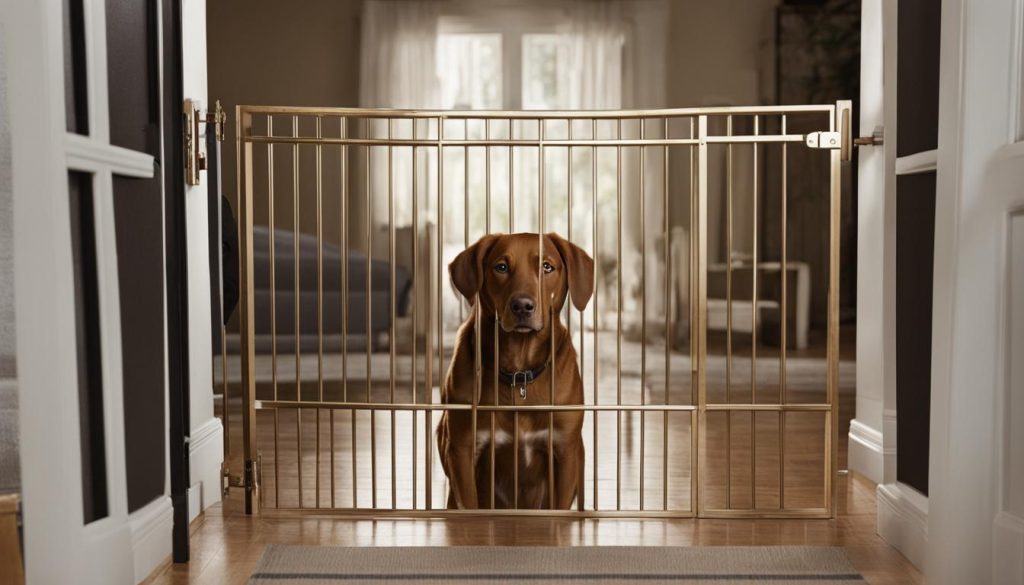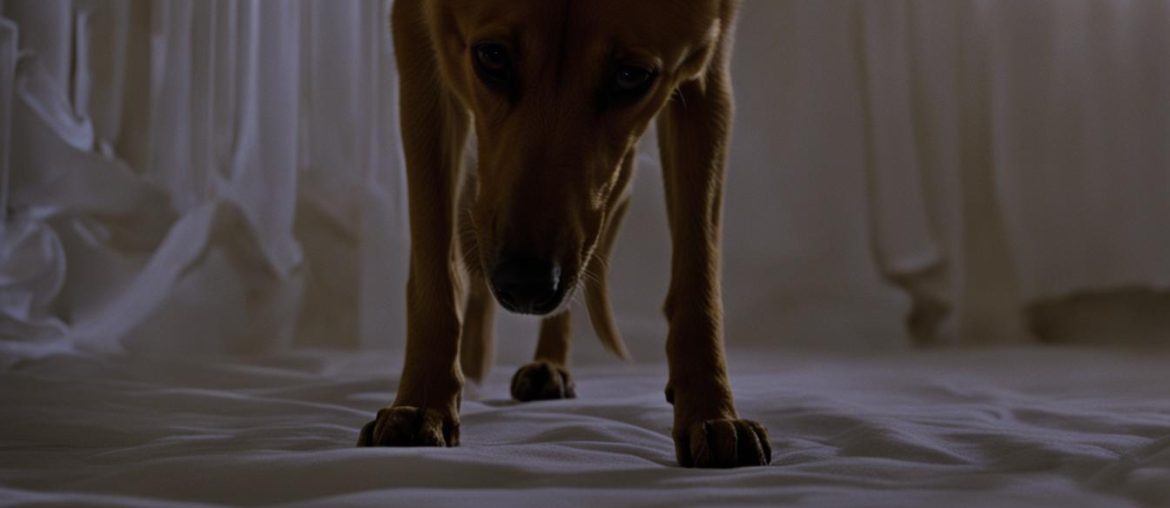Are you frustrated by the sight of your dog peeing on your bed? This behavior can be both puzzling and inconvenient, but there are reasons why dogs engage in this behavior. Understanding the underlying causes can help you address and prevent this issue, ensuring a clean and comfortable sleeping environment for both you and your furry friend.
Key Takeaways:
- There are various reasons why dogs pee on the bed, including age-related accidents, marking behavior, health issues, and anxiety or stress.
- Potty training and managing incontinence are important for preventing accidents caused by young puppies and senior dogs.
- Marking with urine is a natural behavior in dogs, especially in intact or adolescent dogs who are exploring their boundaries.
- Changes in bathroom behavior, such as peeing on the bed, may indicate underlying health issues that require veterinary attention.
- Anxiety or stress can lead to accidents on the bed, addressing the underlying causes can help prevent this behavior.
Age-Related Accidents
Age-related accidents can be a common reason why dogs pee on the bed. This behavior is more prevalent in young puppies who are still in the process of potty training and have not yet learned appropriate places to relieve themselves. As they are still developing bladder control, accidents can happen, and the bed may become a target.
On the other hand, senior dogs may also experience incontinence, which can lead to urine leakage while they are sleeping on the bed. This can occur due to weakened bladder muscles or underlying health conditions. It’s essential to differentiate between age-related accidents and potentially serious health issues that require veterinary attention.
To address age-related accidents in puppies, consistent potty training is vital. Providing them with frequent opportunities to go outside or use designated potty spots can help reinforce appropriate bathroom behaviors. Using positive reinforcement, such as treats or praise, when they eliminate in the correct location can further encourage proper habits.
| Potty Training Tips | Incontinence Management |
|---|---|
|
|
For senior dogs with incontinence, it’s crucial to consult with a veterinarian to address any underlying health issues. The vet may recommend specific treatments or medications to manage the incontinence. Additionally, providing senior dogs with comfortable bedding that is easy to clean can help mitigate the impact of accidents on the bed.
Overall, age-related accidents can be managed through proactive potty training, consistent supervision, and addressing any underlying health concerns. With patience and appropriate care, dogs can learn proper bathroom behaviors and minimize accidents on the bed.

Marking With Urine
Dogs have a natural instinct to mark their territory with urine, which can include objects such as furniture, walls, and yes, even the bed. This marking behavior is not a sign of dominance or territoriality, as commonly believed. Instead, it is a way for dogs to leave their scent and communicate with other dogs in a communal space.
Marking tends to be more common in intact dogs, particularly males, as they have higher levels of testosterone. However, it can also occur in spayed or neutered dogs, especially if they have not been properly trained or if they are experiencing hormonal imbalances during adolescence.
To address marking behavior, it’s important to first rule out any underlying medical issues that may be contributing to the behavior. Once medical causes have been ruled out, the best approach is a combination of consistent training, management strategies, and addressing any potential triggers for marking behavior.
“Marking behavior in dogs is a natural instinct, but it can be frustrating for pet owners. It’s important to remember that dogs do not mark out of spite or to dominate their owners. By understanding the reasons behind marking and implementing appropriate training techniques, pet parents can help their dogs overcome this behavior.”
Management Strategies for Marking Behavior
Here are some strategies to help manage marking behavior in dogs:
- Provide consistent potty training: Reinforce proper potty training techniques from an early age, using positive reinforcement and rewards for appropriate elimination behaviors.
- Restrict access to marked areas: Limit your dog’s access to areas where they have marked previously. Use baby gates or closed doors to prevent access to certain rooms.
- Keep the bed clean: Thoroughly clean any areas that have been marked with an enzymatic cleaner to eliminate the scent and discourage further marking.
- Address any underlying anxiety or stress: Dogs may mark as a response to anxiety or stress. Identifying and addressing the root cause of their anxiety can help reduce marking behavior.
Remember, consistency and positive reinforcement are key when addressing marking behavior. With time, patience, and the right approach, pet owners can help their dogs overcome this natural instinct.
Underlying Health Issues
When a dog starts peeing on the bed, it may be a sign of underlying health issues that need attention. Dogs rely on their owners to recognize changes in their behavior and provide the necessary care. In this section, we will explore some common health issues that can cause dogs to urinate on the bed.
One potential cause is a urinary tract infection (UTI), which can cause discomfort and a frequent urge to urinate. Dogs with UTIs may have accidents on the bed as a result. Other health issues, such as bladder stones or kidney problems, can also lead to changes in urination patterns. It is crucial to consult with a veterinarian to diagnose and treat these underlying health issues.
Cognitive issues, such as dementia or cognitive dysfunction syndrome (CDS), can also affect a dog’s bladder control. Dogs with cognitive issues may have difficulty recognizing when they need to go outside to pee, leading to accidents on the bed. It is important to provide appropriate care and management strategies to support dogs with cognitive issues.

Table: Common Underlying Health Issues
| Health Issue | Symptoms | Treatment |
|---|---|---|
| Urinary Tract Infection (UTI) | Frequent urination, discomfort, blood in urine | Antibiotics prescribed by a veterinarian |
| Bladder Stones | Frequent urination, straining, blood in urine | Surgery or dietary changes |
| Kidney Problems | Increased thirst, changes in appetite, weight loss | Treatment based on the specific condition |
| Cognitive Dysfunction Syndrome (CDS) | Disorientation, changes in sleep patterns, accidents in the house | Medications, environmental enrichment, and management strategies |
Understanding the role of underlying health issues in a dog’s bedwetting behavior is vital for effective management and treatment. By addressing these issues and providing appropriate care, pet owners can help their dogs regain proper bladder control and prevent accidents on the bed.
Anxiety and Stress as Reasons for Dog Peeing on the Bed
Dogs, like humans, can experience anxiety and stress, which may cause them to pee on the bed. Anxiety and stress can be triggered by various factors such as loud noises, changes in routine, or separation from their owners. Understanding and addressing these underlying emotions is crucial in preventing this behavior.
Separation anxiety is a common cause of dogs peeing on the bed. When left alone, dogs with separation anxiety may feel distressed and exhibit destructive behaviors, including urinating on the bed. Implementing strategies to alleviate their anxiety, such as gradual desensitization and providing interactive toys or puzzles, can help reduce their need to mark their territory in this way.
In addition to separation anxiety, fear-induced stress can also lead to bedwetting. Dogs that are scared or anxious may lose control of their bladder, especially if they associate the bed with safety and comfort. Creating a calm and secure environment for your dog, using positive reinforcement, and providing them with a designated safe space can help reduce their anxiety levels and prevent accidents.

Table: Signs of Anxiety and Stress in Dogs
| Behavioral Signs | Physical Signs |
|---|---|
| Excessive barking or whining | Restlessness or pacing |
| Panting or drooling excessively | Trembling or shaking |
| Chewing or destructiveness | Loss of appetite or overeating |
| Trying to escape or hide | Excessive shedding |
| Aggression or withdrawal | Increased heart rate |
Note: These signs may vary depending on the individual dog and their specific triggers.
How to Stop a Dog Peeing on the Bed
To prevent your dog from peeing on the bed, there are several effective strategies you can try. Here are some key steps to take:
- Potty Training: Implement a consistent potty training routine to teach your dog where they should eliminate. Take them outside frequently, especially after meals or naps, and reward them with treats or praise when they use the designated potty area. This will help reinforce the desired behavior and discourage them from peeing on the bed.
- Supervision: Keep a close eye on your dog, particularly when they are in the bedroom or near the bed. If you notice any signs that they may be about to pee on the bed, redirect their attention and guide them to the appropriate potty spot. Using positive reinforcement, such as treats or a clicker, can help reinforce the desired behavior.
- Limiting Bed Access: If your dog continues to have accidents on the bed, consider limiting their access to the bedroom. You can close the bedroom door or use baby gates to create a barrier. By preventing your dog from reaching the bed, you can help break the habit of peeing on it.
Additionally, it’s important to address any underlying issues that may be contributing to the behavior. If your dog is experiencing anxiety or stress, consult with a professional dog trainer or behaviorist for guidance on how to manage and reduce these emotions. They can provide you with additional strategies tailored to your dog’s specific needs.
Remember, consistency and patience are key when working to stop a dog from peeing on the bed. With the right training techniques and management strategies, you can help your dog learn appropriate bathroom habits and create a more harmonious living environment.

Tips for preventing access to the bed:
- Close the bedroom door to keep your dog out of the room
- Use leash training to keep your dog by your side when entering or exiting the room
- Set clear boundaries and consistently reinforce them
- Use positive reinforcement and rewards for desired behaviors
Managing the Situation
When it comes to addressing a dog peeing on the bed, there are various approaches that can be taken depending on the specific situation. Seeking professional help from a dog trainer or behaviorist can provide valuable guidance tailored to the dog’s individual needs and circumstances. These experts can assess the behavior, identify any underlying issues, and create a customized training plan to address the problem effectively.
In cases where the dog is experiencing incontinence, particularly in geriatric dogs, managing the situation may involve the use of diapers or potty pads. These can help contain any accidents and provide a level of comfort for the dog. Regularly changing and cleaning the bedding is also important to maintain hygiene and prevent odor buildup.
For adolescent dogs that may be exhibiting bedwetting behavior, a combination of training and mental stimulation is often beneficial. Providing appropriate outlets for their energy and redirecting their behavior can help them develop healthier habits. Engaging toys, puzzle feeders, and interactive play sessions can help keep the dog mentally stimulated and reduce any anxiety or stress that may be contributing to the problem.
| Dog Training Tips | Professional Help | Incontinence Management | Adolescent Dogs |
|---|---|---|---|
| Consult a professional dog trainer or behaviorist | Seek expert guidance tailored to the dog’s needs | Consider using diapers or potty pads | Provide training and mental stimulation |
| Address underlying behavioral issues | Get assessed to identify the root causes | Regularly change and clean bedding | Engage in interactive play sessions |
| Implement a customized training plan | Develop a tailored approach to the dog’s behavior | Provide appropriate outlets for energy |
Remember, it is important to approach the situation with patience and positive reinforcement. Punishment or anger towards the dog will not effectively resolve the issue and may contribute to more anxiety or stress. Instead, focus on calmly addressing the behavior, providing consistent training, and rewarding desired behaviors. With time, patience, and appropriate management techniques, you can help your dog overcome bedwetting behavior and create a healthier environment for both you and your furry friend.
Avoid Angry Reactions
When it comes to dealing with a dog that has peed on the bed, it’s crucial to avoid angry reactions. Expressing anger towards your dog can have negative consequences and potentially worsen the behavior you’re trying to address. Dogs don’t understand punishment in the same way humans do, and reacting angrily can make them scared or anxious.
Instead, it’s essential to approach the situation calmly and use positive reinforcement as a means of encouraging desired behaviors. Positive reinforcement involves rewarding your dog for good behavior, such as using the designated potty spot or staying off the bed. By rewarding positive actions, you can encourage your dog to repeat them in the future.
Remember that dogs respond best to consistent and patient training methods. By avoiding anger and focusing on positive reinforcement, you can create a safe and supportive environment for your dog, helping them learn and grow.
“Anger is not an effective way to address dog behavior. It can make them fearful and anxious, leading to more unwanted behaviors. Positive reinforcement, on the other hand, promotes learning and strengthens the bond between you and your pet.” – Professional Dog Trainer
The Power of a Dog’s Sense of Smell
A dog’s sense of smell is truly remarkable. It is estimated that dogs have an olfactory system that is 10,000 to 100,000 times more sensitive than that of humans. This incredible sense of smell allows dogs to detect and identify a wide range of scents, from the faintest traces of drugs and explosives to the comforting scent of their owners. Dogs rely heavily on their sense of smell to navigate the world around them, and it plays a crucial role in their communication, hunting, and survival instincts.
When a dog pees on the bed, one possible explanation is that they are attracted to their owner’s scent. Just as dogs roll in the scent of dead animals or other strong-smelling substances, they may view their owner’s scent as something desirable and comforting. The familiar smell of their owner can provide a sense of security and reassurance, which may be particularly appealing when they are resting or sleeping.
Please be aware that this behavior is not a sign of disobedience or defiance. Dogs are simply following their instincts and responding to the powerful signals that their nose sends to their brain. Understanding and respecting a dog’s sense of smell can help us better understand their behavior and strengthen the bond we share with our furry companions.

Exploring the Rolling Behavior
The rolling behavior that dogs exhibit in response to strong smells is fascinating to observe. It is believed that dogs engage in rolling to transfer the scent onto their own bodies, creating a sort of olfactory calling card. By carrying the scent with them, dogs can communicate with other dogs and animals in their environment. This behavior serves as a way for them to leave their mark and establish their presence.
While rolling in strong-smelling substances is instinctual for dogs, it’s important to be mindful of their safety. Some substances may be toxic or harmful to them, so it’s essential to supervise them and prevent them from rolling in anything that could be dangerous.
“A dog’s sense of smell is like a superpower. It allows them to experience the world in a way that we can only imagine.”
To summarize, a dog’s attraction to their owner’s scent is a natural behavior rooted in their powerful sense of smell. When they pee on the bed, it’s not a deliberate act of defiance but rather an instinctual response to the comforting scent they associate with their owner. Understanding and appreciating a dog’s sense of smell can help us nurture a stronger bond and create a safe and enriching environment for our beloved pets.
Your Dog is Overly Submissive
Dogs that exhibit overly submissive behavior may have an excitable bladder, which can lead to urinating in response to various emotions such as fear or excitement. This behavior is most commonly seen in puppies and is often outgrown as they mature and gain confidence. However, in some cases, this submissive urination may persist into adulthood and require attention from a veterinarian or animal behaviorist.
Submissive urination is a natural response for some dogs who feel overwhelmed or anxious in certain situations. They may lose control of their bladder as a way to communicate their submission and avoid conflict. Common triggers for submissive urination include meeting new people or other dogs, unfamiliar environments, or any situation that causes fear or excitement.
To help manage submissive urination, it’s important to approach these dogs with patience and understanding. Avoid any actions or behaviors that may further intimidate or stress the dog, such as direct eye contact, reaching out to pet them, or using a loud or stern voice. Instead, focus on creating a calm and positive environment and gradually building their confidence through reward-based training and socialization.
Table: Tips for Managing Submissive Urination
| Tip | Description |
|---|---|
| 1. | Refrain from using punishment or scolding |
| 2. | Approach the dog calmly and avoid quick movements |
| 3. | Avoid direct eye contact |
| 4. | Allow the dog to approach you at their own pace |
| 5. | Praise calm and confident behavior |
| 6. | Provide plenty of opportunities for socialization |
| 7. | Implement reward-based training to build confidence |
| 8. | Consult with a veterinarian or animal behaviorist for additional guidance |
By following these tips, you can help your overly submissive dog overcome their excitable bladder and gain more confidence in various situations. Remember, patience and positive reinforcement are key in addressing this behavior and helping your dog feel more comfortable and secure.
Wrapping Up
Dogs peeing on the bed can be a frustrating behavior to deal with, but understanding the underlying reasons can help address and prevent it. Whether it’s age-related accidents, marking behavior, health issues, or anxiety and stress, a tailored approach is necessary to tackle this issue.
To effectively address bedwetting behavior, it’s crucial to implement appropriate training and management techniques. Thoroughly clean the bedding to remove any lingering urine smell. Potty training and consistent supervision can go a long way in preventing accidents. Additionally, limiting the dog’s access to the bed and addressing any underlying anxiety or stress are important steps.
If you’re struggling to address this issue on your own, don’t hesitate to seek professional help. A skilled dog trainer or behaviorist can provide guidance tailored to your dog’s specific needs. Remember, it’s important to approach the situation with patience and positive reinforcement, avoiding anger or punishment as it can worsen the behavior.
By understanding the reasons behind your dog peeing on the bed and taking proactive measures, you can work towards resolving this issue, creating a happier and more harmonious living environment for both you and your furry friend.
FAQ
Why does my dog pee on my bed?
Dogs may pee on the bed for various reasons, including age-related accidents, marking behavior, underlying health issues, and anxiety or stress.
What are age-related accidents?
Age-related accidents refer to young puppies who have not yet learned appropriate places to pee and senior dogs who may experience incontinence, causing them to dribble urine while sleeping on the bed.
Why do dogs mark with urine?
Dogs may use urine to mark objects, including the bed, as a way to leave their scent in a communal space. This behavior tends to be more common in intact dogs and adolescent dogs testing boundaries.
Can health issues cause dogs to pee on the bed?
Yes, changes in bathroom behavior, including peeing on the bed, can be a sign of underlying health issues such as urinary tract infections and cognitive issues. Consulting a veterinarian can help rule out any health conditions.
Do anxiety and stress contribute to dogs peeing on the bed?
Yes, dogs may pee on the bed due to anxiety or stress caused by loud noises, fear-inducing situations, or separation anxiety. Addressing the underlying anxiety or stress can help prevent this behavior.
How can I stop my dog from peeing on the bed?
Thoroughly clean the bedding, implement potty training techniques, limit the dog’s access to the bed, and address any underlying issues, such as anxiety or fear. Consulting with a professional dog trainer or behaviorist may also be beneficial.
How can I prevent my dog from peeing on the bed?
Limit the dog’s access to the bedroom by closing the door or using a leash, set boundaries consistently, and use positive reinforcement for desired behaviors. Consulting a professional can provide tailored guidance.
What should I do if my dog has peed on the bed?
Avoid angry reactions, as dogs cannot understand punishment. Thoroughly clean the bedding, address the situation calmly, and use positive reinforcement for desired behaviors.
Why are dogs attracted to their owner’s scent?
Dogs have a strong sense of smell and find comfort in their owner’s scent, similar to their rolling behavior in strong-smelling substances. This behavior is natural and common.
Can submissive behavior contribute to a dog peeing on the bed?
Yes, overly submissive dogs may have an excitable bladder and urinate in response to various emotions such as fear or excitement. This behavior is most common in puppies but may persist into adulthood and require attention from a veterinarian or animal behaviorist.
What is the conclusion about dogs peeing on the bed?
Dogs may pee on the bed for various reasons, including age-related accidents, marking behavior, health issues, and anxiety or stress. Understanding the underlying cause and implementing appropriate training and management techniques can help address and prevent this behavior. It’s important to consult with a professional if needed and to approach the situation with patience and positive reinforcement.






